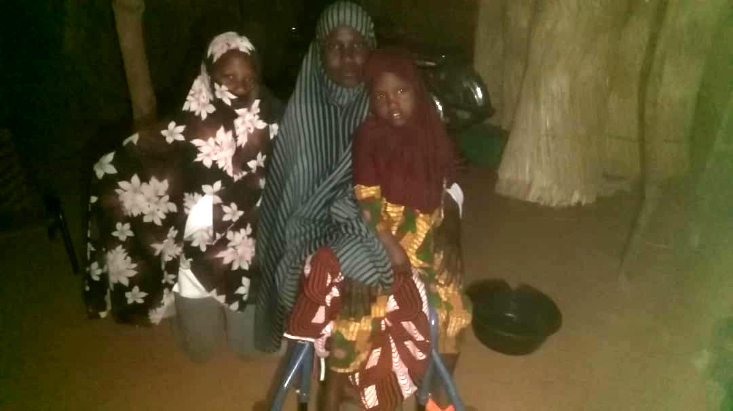
Djamila Moussa lives in Niamey, at the edge of the Sahara desert, and works as an artisan craftswoman. She enjoys playing basketball in her free time and caring for her two daughters. A little over a year ago, she started using a Wildebeest wheelchair, which has wide tires and seemed like a good idea in the sandy city. To the north is the Sahara desert and the Savanna is to the south. This massive, semi-arid transition zone is called the Sahel and it stretches from Senegal in the West on the Atlantic Ocean to Eritrea in the East on the Red Sea. Like many working mothers, each day she is busy cooking for children, shopping, commuting to work, and doing housework. Participant, the manufacturer of her wheelchair, was excited for the opportunity to interview her and learn from her experience.
The tricycle wheelchair that Djamila used previously is pretty common in West Africa. It is relatively easy to manufacture and works best outside on roads and in open spaces. However, it is also heavy and challenging to use in sand, even when helpers were able to push from behind.

With the Wildebeest, Djamilla has had several moments when she was more independent. Once her child was sick and she was able to go by herself to get medicine. Another time, her relative was sick in the hospital. Because the Wildebeest can be used indoors, she was able to mobilize herself into the hospital and sit in her wheelchair while visiting. This was better than being carried and lifted to be on the hospital bed with her family member. Also, she is able to go in taxis, like a Toyota Starlet or Toyota HiAce which is locally called a “Faba Faba”, and have her chair to use at the destination. The transportability is a big advantage, but it is also an area for improvement.
Defying all terrains
Ibrahim Sala Samber works as a physiotherapist with the International Committee (ICRC) of the Red Cross in Niamey.

“Our team provided the Wildebeest to Djamila in the course of an empirical research study to find a wheelchair that is suitable for the Sahel context. People with disabilities in Niger face innumerable difficulties with mobility in their sandy environment. This is a huge constraint on their social integration and dignity. The ICRC is committed to these goals and that is why we have been working hard on this challenge.”
The Wildebeest has two removable rear wheels and the back folds down. This means putting the chair into a taxi requires several steps, which may not be familiar to the taxi driver. Some wheelchairs simply remain in one piece and fold, which is more simple for everyone to understand. “With some effort and multiple steps, the new chair can go into a vehicle. Because of this, I was able to go far away to attend a special celebration with my friends.” said Djamila.
Djamila's Craftsmanship
At work, Djamila makes Jigida, which are beads and ornaments that are worn around the waist. Also, the artisan shop also makes perfumes by hand and other beaded products. Djamila is especially skilled at knitting clothes for children. The business is near her home and she can easily commute in her wheelchair by herself.
Family emergencies have been a concern.
If a child falls or there was a serious issue, Djamila would previously stay on the ground and move slowly. Now, she is able to move quickly and maneuver around as needed. “The new chair is fun to drive and comfortable to sit in, even for long periods when I am working. It rolls smoothly and I am more efficient in my daily tasks. Outside it works well, even in a little sand. But, deep sand is still very difficult.” said Djamila.
Samira, Djamila’s daughter said, "Our mother's old wheelchair was much harder to push on sandy terrains than the new one. The new wheelchair doesn't require much effort."
“Mobilizing through sand is a real challenge when the power must come from our relatively small arm and shoulder muscles. There’s a bit more improvement to be done on the Wildebeest, but we will hit a ceiling with the limited power.” said Keoke, who works at Participant. “The modified motorcycle that Djamila uses is a good solution. We are also developing an electric motor add-on attachment for the front of our wheelchairs. I hope that Djamila will also give her feedback on that.”
When she considered the most important points about Wildebeest, Djamila said,
“My biggest wish is that my chair will be reliable for me in the years to come and I think it will be because it is solid and well-built.”






